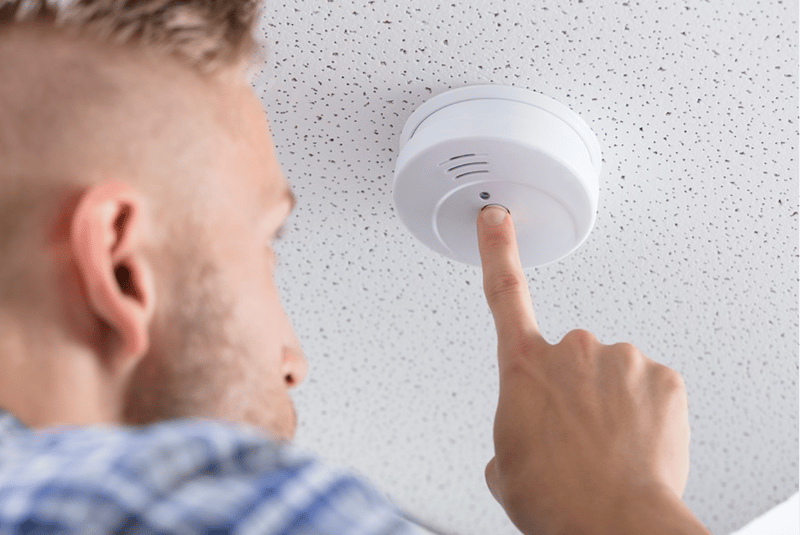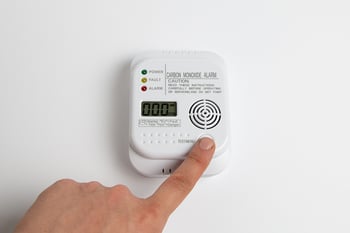Knowledge Center

Smoke and carbon monoxide (CO) detectors: every home needs them, yet they often get overlooked because many forget they’re there—that is, until the alarms sound or make the chirping noise indicating a low battery. Like many other household objects, these devices need routine maintenance to ensure they’re working correctly. Without them functioning, your home, loved ones, and belongings are vulnerable to physical harm. So, how often do you need to check smoke and CO detectors? And how do you do so?
Why Smoke and Carbon Monoxide Detectors Are Crucial
Before getting into the “how” and “when,” it’s important to hark back to the “why.”
Fire alarms are needed to alert people to smoke and/or fire in the building, allowing them the chance to escape. Despite efforts to prevent house fires, they can still sneak up on anyone thanks to the many common fire hazards present in daily life—from stoves and fuse boxes to space heaters and candles. According to the National Fire Protection Association:
- Almost 3 out of 5 home fire deaths result from fires in properties without working smoke alarms.
- More than one-third of home fire deaths result from fires in which no smoke alarms are present.
- The risk of dying in a home fire is cut in half in homes with working smoke alarms.
Carbon monoxide detectors are needed to alert people to the presence of CO in the air—a colorless, odorless, tasteless gas that can poison humans and even result in death. Known as the “silent killer,” CO is virtually undetectable by humans, but things like portable generators and running cars are threats. According to the U.S. Consumer Product Safety Commission:
- An average of 170 people die each year from CO produced by non-automotive products.
- Several thousand people go to the emergency room each year for CO poisoning.
- CO detectors are designed to alarm before life-threatening levels of CO are reached.
How to Check Smoke and CO Detectors Properly
How you maintain the detectors will depend on which types you have. Always defer to the manufacturer’s instructions on the device, but some general maintenance tips are:
Testing Fire Alarms
- Safely climb onto a stool.
- Press the ‘test’ button for the alarm to sound.
- Unscrew the plastic cap to replace the battery at least once per year in 9-volt battery-operated devices and hardwired devices.*
*Note: Lithium battery-operated devices do not require battery replacements but still need to be tested regularly.
Testing CO Detectors 
- Press the ‘test’ button for the alarm to sound.*
- If the device has replaceable batteries, replace them every six months. If the battery is sealed, there is no need to replace it, as it’s designed to last as long as the detector does.
*Note: This test only confirms the device has adequate electrical power. To test that the sensors are working, you can buy a CO test kit where CO detectors are sold.
When to Check Smoke and CO Detectors
The U.S. Fire Administration recommends testing smoke alarms monthly, while other sources recommend testing twice each year. To remember this, consider putting the chore on your annual spring cleaning and fall maintenance lists or planning for the beginning and end of daylight saving time. Carbon monoxide detectors should be tested monthly. Moreover, most smoke alarms need to be fully replaced every 10 years, while most CO detectors need to be replaced every 5-7 years. Again, defer to the manufacturer’s instructions on your devices to confirm.
The importance of working smoke alarms and carbon monoxide detectors can’t be overstated. Regular, proper maintenance of these life-saving devices is crucial for preventing danger and devastation. That said, in the event of a house fire or carbon monoxide leak, your homeowner's or renter's insurance will reimburse you for loss of or damage to your home and belongings.
This article is not intended to be exhaustive, nor should any discussion or opinions be construed as legal advice. Readers should contact legal counsel or an insurance professional for appropriate advice.
This article is not intended to be exhaustive, nor should any discussion or opinions be construed as legal advice. Readers should contact legal counsel or an insurance professional for appropriate advice.
About the Author

We’re ready to help you
protect what matters most
Discuss your options for protecting your reputation and your business.

